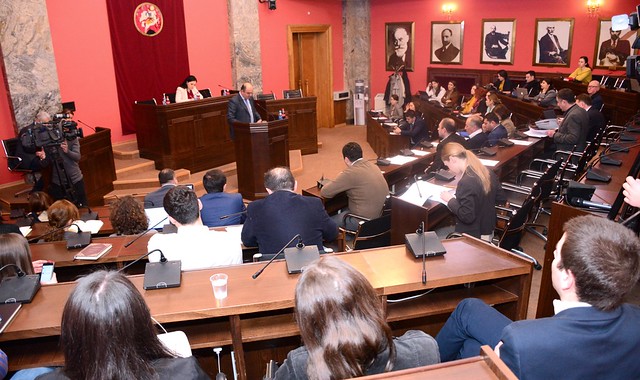Recommendations Included in Parliamentary Report 2016 concerning Realization of Right to Fair Trial
The deficiencies identified in terms of the realization of the right to a fair trial in 2016 shows that the reform of the judiciary system must be necessarily continued.
Despite a number of positive changes made within the framework of the third wave of reform, it is regrettable that the procedure, according to which, the right to appoint chairmen of court/chamber/collegium still remains in the to High Council of Justice, has not been changed; the same can be said about the regulation, according to which, 5 out of 9 members of the High Council of Justice (judges of common courts) can simultaneously be chairman/first deputy chairman/ deputy chairman of the chamber, collegium or court. Such a high representation of power in the High Council of Justice creates the risk of concentration of power there, while occupation of several positions simultaneously by high-rank officials of the courts increases the existing hierarchy among judges.
Reflection of the rule of electronic distribution of cases of common courts in the legislation is a step forward, though it is necessary to ensure that the mentioned change timely takes effect.
In the reporting period, the Public Defender studied the legality of the dismissal of the Tbilisi City Court Chairman and the Chairman of the Collegium and indentified non-compliance of the decision of the High Council of Justice with the law, which more clearly showed deficiencies in this important body of the judiciary.
Like previous years, unreasonable delay in the review of cases by the Tbilisi and Kutaisi courts of appeal and violation of the presumption of innocence were still significant problems in 2016.
The principle of equality of arms was violated in the so-called Cyanide Case, as the Prosecutor's Office obliged the defense not to disclose information, whereas the prosecutors themselves voiced various details of the case and thereby put the defendant in an unequal situation.
In the reporting period, the problem of implementation of the decisions of the Constitutional Court by common courts was clear; the common courts took into account only the resolutive part of the decisions of the Constitutional Court, while explanations and observations were left beyond attention.
The Public Defender has appealed to the Constitutional Court as amicus curiae for the purpose of assessing the constitutionality of an unpredictable article. In particular, as a result of studying the so-called Cables Case, the Public Defender concluded that the legislative norm on embezzlement is not predictable and can be subjected to broad interpretation.
The Public Defender demands proper protection of the procedural law and the rule of voluntary questioning of witnesses, as in the reporting period some witnesses indicated that they were forcedly questioned by police.
Important gaps were revealed in the legislation and practice as a result of studying the cases reviewed by the jury in the reporting period. There were cases when the violation of order at the trial damaged the honor and dignity of the defendant, and confidentiality of personal information of defendants was violated. It was found that there is no mechanism that would protect the jury from public and media pressure; the legislation does not provide for sufficient safeguards against the illegality of the verdicts of the jury and the risk of arbitrariness of the jury is not sufficiently limited.
The Public Defender has repeatedly addressed common courts, the Parliament of Georgia, the Prosecutor's Office, the Ministry of Internal Affairs and the State Security Service with recommendations concerning numerous violations of the right to a fair trial and eradication of the errors.
















